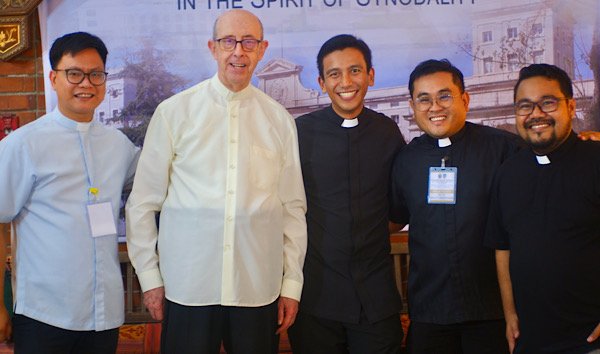Frater qui adiuvatur a fratre quasi civitas firma. (A brother helped by a brother is like a strong city.)
Brotherhood among priests is absolutely necessary to sustain each one in his ministry, aside from sacramental and supernatural graces. They are his friends for they spent years together in the seminary, sharing a good part of their lives together -- liking the same things and disliking the same things (idem velle, idem nolle).
When a brother is helped by his brother, he is like a fortress that is almost indestructible (cf. Prov 18:19). It is edifying to see brother-priests gathering together in unity (cf. Ps 132:1).
This was the atmosphere of the first Grand Alumni Homecoming of the graduates of the Ecclesiastical Faculties of the University of Navarre (Spain) that saw 80 graduates of the Faculties of Philosophy, Theology and Canon Law -- serving 22 dioceses nationwide -- gathered at the tranquil Makiling Conference Center in Calamba, Laguna on July 11-14, 2023.

The first Filipino seminarians went to do their studies at the University of Navarre in 1985. From 1988 onwards, they lived in Seminario Internacional Bidasoa, established for the formation of priests to serve dioceses all over the world. Inspired by the doctrine of Optatam totius of Vatican II -- which declared that the desired renewal of the Church had to start in the seminary -- then Prelate of Opus Dei and now Blessed Alvaro del Portillo conceived the idea of opening the ecclesiastical faculties of the University of Navarre for the so-called theologate phase of seminary formation. A school for seminarians from all over the world was erected for this purpose.
In 1983, the Theological Centrum had been established in Mandaluyong City by some priests, lay faithful and cooperators of the Prelature of Opus Dei as a venue for ongoing formation of diocesan clergy. It conducted monthly recollections and annual retreats for diocesan priests, aside from annual seminars for seminarians.
When the project of sponsoring seminarians to study at the University of Navarre was conceived, the Studium Theologiae Foundation (STF) was formed in 1985 to raise the financial resources necessary. Since then, more than 200 Filipino priests have graduated from this University. Some of them are now formators in the seminary, others are in the diocesan curiae, and many more are serving as parish priests.
In the last two decades, many of these alumni had been clamoring for a homecoming. At the initiative of some members of the Priestly Society of the Holy Cross -- an association of priests attached to the Prelature of Opus Dei -- the dream of an alumni homecoming became a reality when Fr. Juan Luis Bastero, the first Rector of Bidasoa and now 81 years old, came over from Spain. He was accompanied by Fr. Emilio Forte, who serves as a formator at the Bidasoa International Seminary.

The Papal Nuncio to the Philippines, His Excellency Archbishop Charles Brown, celebrated the Opening Mass for the alumni homecoming at the nearby San Isidro Parish in Barangay Milagrosa. Concelebrating were Bishop Marcelino Antonio Maralit (Bishop of Boac), Fr. Julio Dieguez (the Regional Vicar of Opus Dei in the Philippines), Fr. Juan Luis Bastero, Fr. Emilio Forte, Fr. Eugene Fadul (the parish priest), and numerous priests-alumni.
“I thank you for having invited me as the representative of Pope Francis this morning,” Archbishop Brown said in his homily. “I encourage you to be consistent in your spiritual lives: pray and work and never be discouraged. Never be downcast, remembering that everything we do. with God’s power will become super abundant,” the Nuncio told the priests.

The first Filipino graduate of the University of Navarre to become a bishop, Marcelino Antonio Maralit, gave an unforgettable lecture about sacramental brotherhood. Aside from his brilliant theological exposition of the subject, he dedicated a big part of his lecture to sharing his personal experiences. Being a classmate to some and a fellow alumnus to all, he moved many to tears.
He emphasized the love of the priests for their bishop. “If there’s something I would like to ask from you, it is this: love your bishop. If you find it hard, then begin with taking care of your bishop.” He said this not as a bishop but as a fellow alumnus. He encouraged everyone never to leave the bishop alone. He emphasized that the bishop is included in the priestly brotherhood.

He made everyone realize that the joy of a priest redounds to the joy of his brother-priests. If division threatens a diocese, unity among priests will provide strength, with far-reaching consequences.
The participants founded the Alumni Association and elected the first set of officers from various dioceses: Fr. Virgilio Manaog of Palo as president, Fr. Russell Bantiles of Davao as vice-president, Fr. Rolando Panesa of Legaspi as secretary, Fr. Angelo Brucal of Lucena as treasurer and Fr. Eugene Fadul of San Pablo as public relations officer.

On July 14, Bishop Buenaventura Famadico of San Pablo, Laguna celebrated the closing Mass coinciding with his birthday and the 35th anniversary of the foundation of Seminario Internacional Bidasoa. The votive Mass of St. Josemaria Escriva, the First Grand Chancellor of the University of Navarre, was fittingly celebrated.
Even good things, however, come to an end. Everyone was already eagerly asking about the next alumni reunion. Days later, some were still posting homecoming photos in their social media accounts, announcing to the whole world the joys of this historical gathering.
Fr. Juan Luis Bastero, upon returning to Spain, wrote a long “grandfatherly” letter expressing his joy at seeing so many graduates serving the Church. “Truly, this homecoming was unforgettable. ¡Hasta la proxima! (Till the next one!)”
